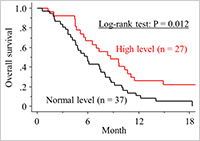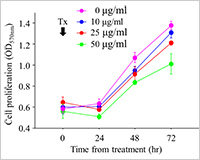Enlarge Image Figure 2. Suppressive effects of anti-RPL29 antibody on the cell proliferation of pancreatic cancer PANC-1 cells via the down-regulation of Wnt/β-catenin signaling pathway in a dose dependent manner
Enlarge Image Enlarge Image
Anti-RPL29 antibody: An autologous antibody to cure malignant tumors
The prognosis for patients with pancreatic cancer is very poor. The 5-year survival rate is less than 10% and mortality has increased recently. Thus there is urgent demand for the development of a new safe and high efficacy therapeutic agent.
A variety of evidence suggests that spontaneous immune responses to autologous tumor-associated antigens affect the cure of malignant tumors, and that some antibodies in sera could influence cancer cells.
Dr. Yasuhiro Miyake (Assistant Professor of Okayama University Hospital) with his colleagues have found the presence of anti-60S ribosomal protein L29 (RPL29) antibody in sera, and showed that the anti- recRPL29-peptides polyclonal antibody inhibited the proliferation of human pancreatic cancer Panc-1 cells via the down-regulation of Wnt/β-Catenin signaling pathway in a dose dependent manner. Recent studies showed the positive correlation between the concentration of anti-RPL29 antibody in sera of pancreatic cancer patient and its prognosis. Anti-RPL29 antibody also showed the suppressive effects on the proliferation of other cancer cells such as lung adenocarcinoma, breast cancer, and hepatocellular carcinoma.
RPL29 is one of approximately 80 structural ribosomal proteins, and is highly expressed on the surface of a cancer cell. Silencing RPL29 by RNA interference in cancer cells induces the cell cycle arrest at G0/G1 phase and promotes its apoptosis. RPL29 null mutation in vivo does not show either embryonic lethality or anatomical defects in an animal model (KO mouse).
Based on the results of these studies, anti-RPL29 antibody could be a first-in-class molecular-targeted drug for the treatment of malignant tumors. In addition, the concentration of the anti-RPL29 antibody in sera can be a new diagnostic biomarker for the treatment of malignant tumors. Further investigations are in process.
[Enquires]
Professor Yutaka Watanabe, Ph.D.
Organization for Research Promotion & Collaboration(ORPC), Intellectual Property Office, Okayama University
http://www.okayama-u.net/renkei/contents_e/index.html
wyutaka@cc.okayama-u.ac.jp



